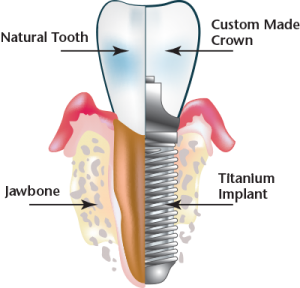Dental Implants
Implants are an exciting technology that allows you to fill spaces in your smile created by missing teeth. In the past, replacing a missing tooth involved making a bridge, a device that attaches to the teeth surrounding the edentulous (without teeth) space, or by providing a removable partial denture. An implant, in contrast, remains in your mouth and functions and looks like a natural tooth.
An implant is a replacement or substitute for a tooth root, made of surgical-grade titanium; this material has been demonstrated to be highly biocompatible. The implant is surgically placed into an opening that the dentist prepares to a specific length in your jaw. The implant is allowed to heal for a period of time, usually several months, and then is used to support an artificial tooth that looks and feels like a natural tooth. The surgery, in general, is very straightforward, and well-tolerated, with the majority of patients experiencing little or no discomfort. An implant-supported crown can function for years in your mouth. Patients enjoy the fact that they can replace a tooth without resorting to a removable denture, and without having to grind down other teeth.
Implants can also be used to stabilize a denture, most often for the lower arch. Many patients who wear a lower denture report that their denture is loose and unstable. Part of the reason for this is that the denture is pushed by the tongue during use; also, the amount of tissue that a lower denture covers is much smaller than for the upper arch, and therefore , retention of the denture is reduced. Two full-sized implants or four small diameter implants (mini-implants) are carefully placed into the jaw during a minor surgical procedure that is carried out right in the office. Later, a corresponding housing is added to the underside of the lower denture, which allows the denture to “snap” into place, providing a significant increase in retention, and a corresponding decrease in movement. Many patients report that they are able to eat foods that they could not have in the past. The use of mini-implants tends to allow for a shorter healing period, and is less costly than the use of standard-diameter implants.
A very important benefit that implants offer, whether for tooth replacement, or denture stabilization, is that implants help to retain your jaw bone. You may be aware that when a person loses teeth, the bone surrounding the tooth breaks down and shrinks; this process is known as bone resorption. The process of resorption occurs more rapidly in the first 12-18 months following tooth removal, and generally proceeds most rapidly in the lower jaw. Over time, the jaw shrinks in height and width, the net effect being that, especially if you are a denture wearer, your denture will no longer fit properly, and you will need frequent refittings to remain comfortable. Implants function similar to the root of a tooth and provide stimulation to the bone, so that the process of bone resorption is greatly reduced.
Our office will be glad to provide a consultation to determine if you are a good candidate for implants, and will develop a treatment plan to help restore your smile, and help you regain the ability to eat a wide variety of foods so that you can remain healthy and happy through your life.

Make an Appointment Today!
We offer convenient appointments after work or school and we will maximize your insurance!

Our Address
Dental Care of Cuba
18 Center St.
Cuba, NY 14727
U.S.A.
Phone: (585) 968-8400
Office Hours
Monday: 8:20am - 5pm
Tuesday: 8:20am - 5pm
Wednesday: 8:20am - 5pm
Thursday: 8:20am - 5pm
Friday: 8:20am - 4pm
dental care of cuba
For New Patients
New Patient Forms
About Dr. Sessler
Dental Services
Make an Appointment
